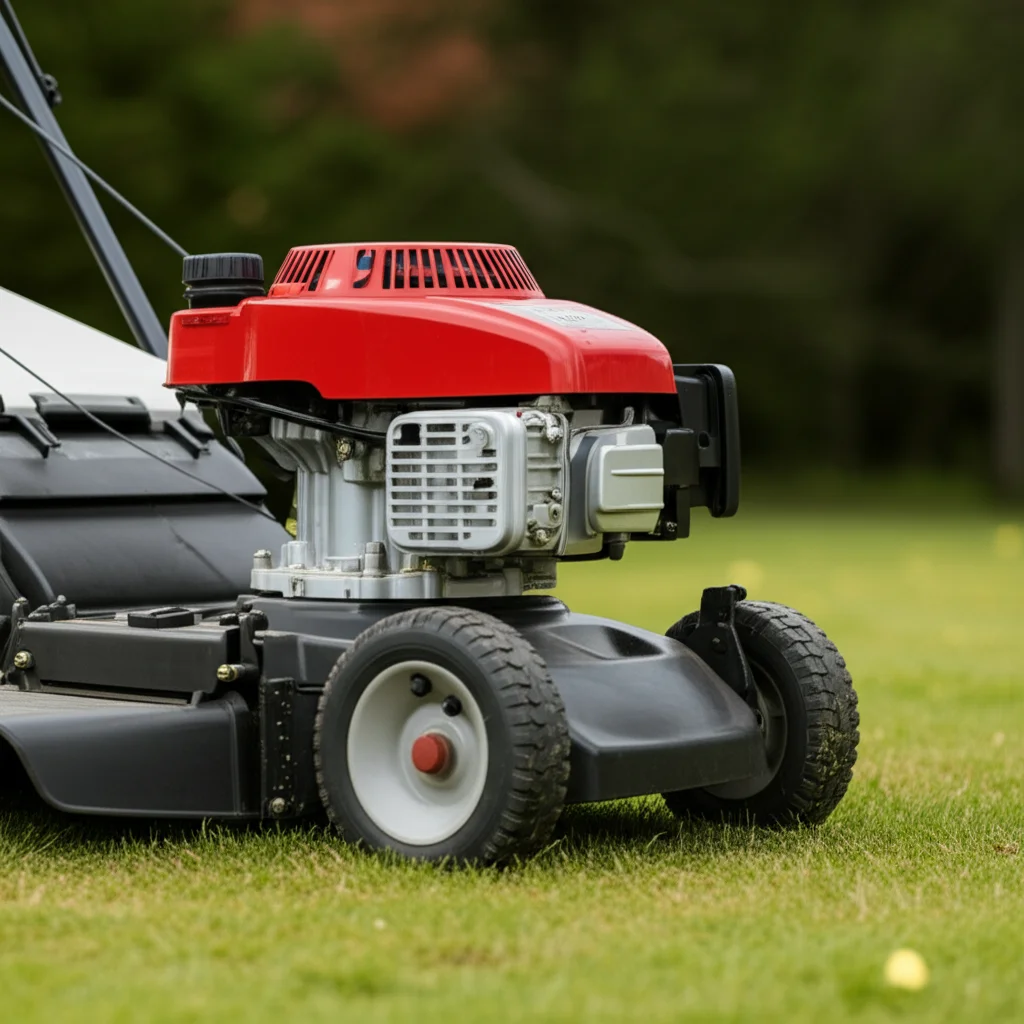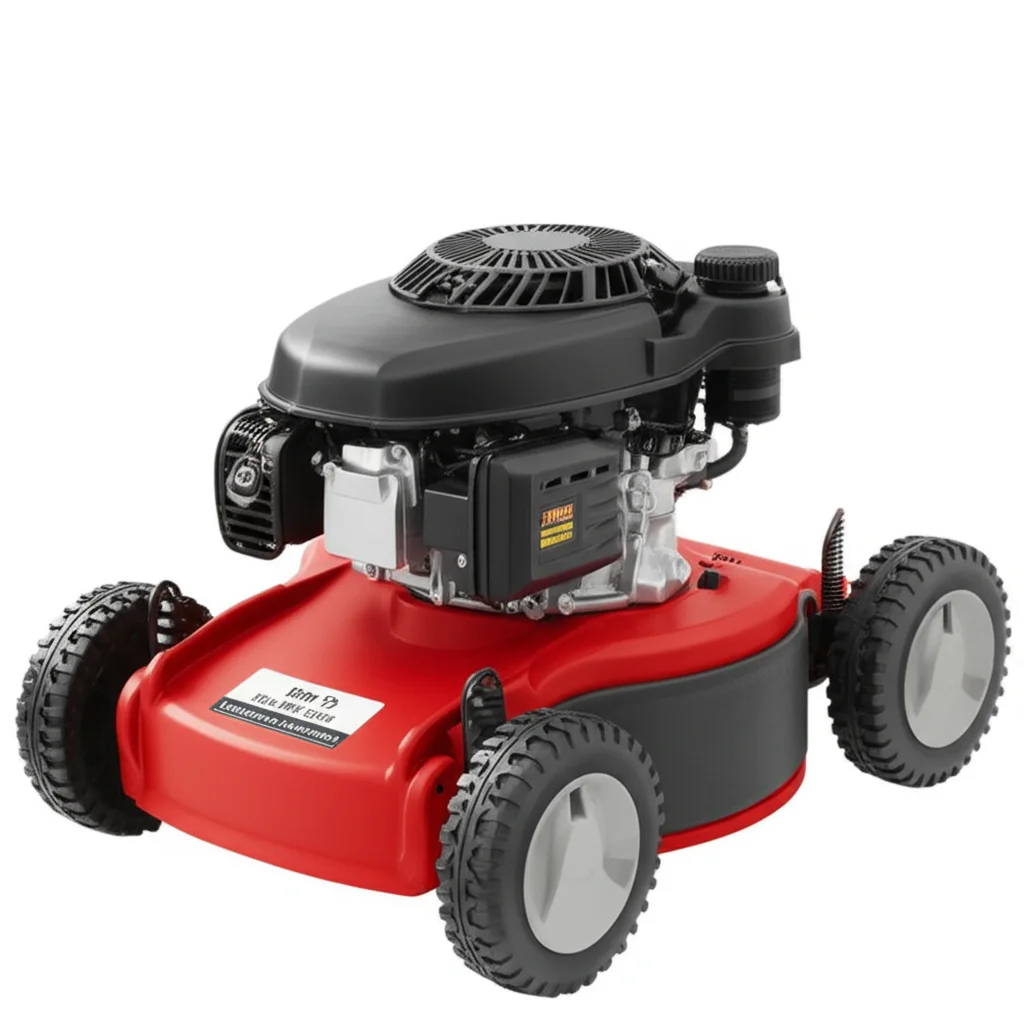· Lawn Mower Maintenance · 10 min read
My Petrol Lawnmower Is Blowing Black Smoke

My Petrol Lawnmower Is Blowing Black Smoke: Causes & Solutions
Nothing’s more frustrating than starting your petrol lawnmower only to see thick black smoke billowing from the exhaust.
If your petrol lawnmower is blowing black smoke, you’re dealing with a combustion issue that needs immediate attention.
This comprehensive guide will walk you through the common causes, diagnostic steps, and practical solutions to get your mower running cleanly again.
Understanding why your lawn mower is smoking black can save you money and prevent costly engine damage.
Key Takeaways
• Rich fuel mixture is the primary cause of black smoke in petrol lawnmowers
• Dirty air filter restricts airflow, leading to incomplete combustion
• Carburetor problems often result in over-fueling and black smoke emissions
• Regular maintenance prevents most black smoke issues
• Quick fixes include cleaning air filter and checking spark plug condition
• Professional help may be needed for carburetor adjustments or engine repairs
Quick Answer: Black smoke from your petrol lawnmower typically indicates a rich fuel mixture caused by a dirty air filter, faulty carburetor, or worn engine components. Clean the air filter first, then check the spark plug and consider carburetor cleaning if the problem persists.
Understanding Why Your Lawn Mower Produces Black Smoke
Black smoke from your petrol lawnmower is essentially unburned fuel being expelled through the exhaust system. When your engine receives too much fuel relative to air, or when combustion is incomplete, the excess fuel burns incompletely and creates that characteristic dark, sooty smoke.
The combustion process in small engines requires a precise air-to-fuel ratio, typically around 14.7 parts air to 1 part fuel. When this balance is disrupted, your mower’s engine struggles to burn fuel efficiently. The result is not only unsightly black smoke but also reduced power, poor fuel economy, and potential long-term engine damage.
Several factors can cause this imbalance, ranging from simple maintenance issues to more complex mechanical problems. The good news is that most causes of black smoke are relatively straightforward to diagnose and fix, especially if you catch them early.
Common Causes of Black Smoke From Lawn Mower When Starting
Dirty or Clogged Air Filter
The air filter is your engine’s first line of defense against dirt, grass clippings, and debris. When it becomes clogged, airflow to the engine is severely restricted. This creates a rich fuel mixture because the carburetor continues to deliver fuel while the engine receives insufficient air for proper combustion.
A dirty air filter is often the culprit when you notice black smoke from lawn mower when starting, especially after the mower has been stored or hasn’t been maintained regularly. Foam filters can become oil-soaked and compressed, while paper filters accumulate dirt until airflow is blocked.
Signs of a dirty air filter include difficulty starting, black smoke during startup, reduced power, and increased fuel consumption. Checking and cleaning your air filter should be your first troubleshooting step.
Carburetor Issues and Adjustments
The carburetor mixes air and fuel in the correct proportions for combustion. When carburetor components wear out or become dirty, they can deliver too much fuel to the engine. Common carburetor problems include:
Stuck or damaged float mechanisms that don’t properly regulate fuel levels, worn needle valves that allow excess fuel flow, and dirty jets that disrupt the air-fuel mixture. These issues often cause the lawn mower black smoke then dies scenario, where the engine starts but struggles to run properly.
Carburetor cleaning is a common maintenance task that can resolve many black smoke issues. However, some carburetor problems require professional adjustment or replacement of internal components.
Faulty Spark Plug
A worn or fouled spark plug can’t ignite the fuel mixture properly, leading to incomplete combustion and black smoke. When spark plugs become carbon-fouled from rich fuel mixtures, they create a cycle where poor combustion leads to more fouling and more black smoke.
Signs of spark plug problems include difficulty starting, lawn mower black smoke sputter during operation, and rough idling. A spark plug that’s black and sooty indicates a rich fuel mixture, while oil-fouled plugs suggest other engine problems.
Replacing the spark plug is inexpensive and can often resolve black smoke issues, especially when combined with other maintenance tasks like air filter cleaning.
How to Fix Black Smoke From Lawn Mower: Step-by-Step Solutions
Step 1: Clean or Replace the Air Filter
Start by locating your mower’s air filter housing, usually a rectangular or round plastic box near the carburetor. Remove the housing cover and inspect the filter element.
For foam filters, wash with warm soapy water, rinse thoroughly, and let dry completely. Lightly oil the foam with clean engine oil before reinstalling. Paper filters should be tapped gently to remove loose debris or replaced if heavily soiled.
Never run your mower without an air filter, as this can cause severe engine damage from ingested debris.
Step 2: Inspect and Replace the Spark Plug
Remove the spark plug using a spark plug wrench and examine the electrode end. A healthy spark plug should have a light brown or tan color. Black, sooty deposits indicate a rich fuel mixture, while wet, oily deposits suggest oil burning issues.
Clean the spark plug with a wire brush or replace it if heavily fouled. Gap the new plug according to your engine manual specifications, typically 0.030 inches for most small engines.
Step 3: Check Engine Oil Level and Condition
Overfilling the crankcase with oil can cause oil to enter the combustion chamber, contributing to black smoke. Check the oil level using the dipstick and drain excess oil if overfilled.
If the oil appears thin or smells like gasoline, it may be contaminated with fuel, indicating carburetor problems that allow fuel to seep into the crankcase.
Step 4: Carburetor Cleaning and Adjustment
If basic maintenance doesn’t resolve the black smoke issue, the carburetor likely needs attention. Remove the air filter and carburetor bowl to access internal components.
Clean all passages with carburetor cleaner and compressed air. Pay special attention to the main jet and idle circuits. Check the float and needle valve for proper operation.
Some carburetors have mixture adjustment screws that may need professional tuning to achieve the correct air-fuel ratio.
Why Is My Riding Lawn Mower Blowing Black Smoke
Riding mowers face unique challenges that can contribute to black smoke issues. Their larger engines and more complex systems require different diagnostic approaches.
Larger Engine Considerations
Riding mower engines typically have higher horsepower and more sophisticated fuel systems. They may feature dual air filters, multiple fuel lines, and more complex carburetor designs. When these systems develop problems, the symptoms can be more pronounced.
The increased engine size also means that maintenance intervals may be different from walk-behind mowers. Check your owner’s manual for specific service requirements.
Fuel System Complexity
Many riding mowers have fuel pumps, multiple fuel filters, and longer fuel lines that can develop problems. Old fuel can gum up these systems, leading to fuel delivery issues that manifest as black smoke.
Engine problems in riding mowers can be more complex and may require professional diagnosis, especially for newer models with emission control systems.
Preventive Maintenance to Avoid Black Smoke Issues
Regular Air Filter Maintenance
Check your air filter every 25 hours of operation or at the beginning of each mowing season. In dusty conditions, inspect it more frequently. A clean air filter is your best defense against black smoke problems.
Consider upgrading to a high-quality aftermarket filter that offers better filtration and longer service life.
Fuel System Care
Use fresh gasoline and add fuel stabilizer if you store your mower for extended periods. Old, stale fuel is a common cause of carburetor problems that lead to black smoke.
Drain the fuel system before winter storage or run the engine dry to prevent fuel-related problems when you restart in spring. Starting problems after winter often relate to fuel system issues.
Engine Oil Maintenance
Change engine oil according to the manufacturer’s schedule, typically every 50 hours of operation or annually. Use the correct oil viscosity for your climate and engine type.
Never overfill the crankcase, as excess oil can contribute to smoking issues and engine damage.
When Black Smoke Indicates Serious Engine Problems
Internal Engine Wear
If basic maintenance doesn’t resolve black smoke issues, you may be dealing with internal engine wear. Worn piston rings, damaged valves, or cylinder wear can cause oil consumption and poor combustion.
These problems typically develop gradually and may be accompanied by other symptoms like reduced power, excessive oil consumption, or unusual engine vibration.
Signs You Need Professional Help
Persistent black smoke after performing basic maintenance, engine oil that consistently turns black quickly, or smoke coming from unusual locations like the dipstick tube indicate serious problems that require professional diagnosis.
Don’t ignore these warning signs, as continued operation can cause catastrophic engine failure.
Comparing Black Smoke vs Other Smoke Colors
Black Smoke vs White Smoke
While black smoke indicates rich fuel mixture or incomplete combustion, white smoke typically suggests oil burning or coolant issues. White smoke from lawn mower when starting often clears up as the engine warms, while black smoke tends to persist.
Blue Smoke Considerations
Blue smoke indicates oil burning, often from worn piston rings or valve guides. This is different from black smoke and requires different diagnostic and repair approaches.
Understanding smoke color helps you communicate effectively with repair technicians and prioritize your troubleshooting efforts.
Frequently Asked Questions
Why is my lawn mower smoking black? Black smoke from your lawn mower indicates incomplete fuel combustion, typically caused by a dirty air filter, carburetor problems, or faulty spark plug. The engine receives too much fuel relative to air, creating a rich mixture that burns incompletely and produces dark, sooty exhaust.
How do you fix black smoke from a petrol engine? Start by cleaning or replacing the air filter, then check the spark plug condition. If black smoke persists, clean the carburetor and check for proper fuel mixture adjustment. Ensure the engine oil level is correct and hasn’t been overfilled, as this can also contribute to smoking.
Why is my petrol lawn mower smoking? Petrol lawn mowers smoke due to combustion problems, oil burning, or fuel system issues. Black smoke specifically indicates too much fuel in the air-fuel mixture, while other smoke colors suggest different problems like oil consumption or cooling system issues.
Why is there black stuff coming out of my lawn mower? Black residue from your lawn mower exhaust is unburned carbon particles from incomplete fuel combustion. This soot indicates your engine is running rich and needs attention to the air filter, carburetor, or spark plug to restore proper fuel burning.
Can I continue using my mower if it’s blowing black smoke? While you can operate a mower with black smoke temporarily, continued use risks engine damage and poor performance. Address the underlying cause quickly to prevent costly repairs and maintain optimal engine function.
How often should I clean my lawn mower air filter? Clean or replace your air filter every 25 hours of operation or at the start of each mowing season. In dusty conditions, check it more frequently. A clean air filter prevents most black smoke issues and protects your engine from damage.
Is black smoke from lawn mower dangerous? Black smoke isn’t immediately dangerous but indicates inefficient combustion that wastes fuel and may damage your engine over time. The smoke contains unburned hydrocarbons and carbon particles that aren’t good for the environment or your health with prolonged exposure.
Final Words
Dealing with a petrol lawnmower blowing black smoke doesn’t have to be overwhelming. Most black smoke issues stem from simple maintenance problems like dirty air filters or worn spark plugs that you can address yourself.
Start with basic maintenance tasks like cleaning the air filter and replacing the spark plug, as these solve the majority of black smoke problems.
Regular preventive maintenance, including proper fuel storage and timely oil changes, prevents most smoking issues before they start.
If basic troubleshooting doesn’t resolve the problem, don’t hesitate to consult a professional technician who can diagnose more complex carburetor or internal engine issues.
Take action quickly when you notice black smoke to prevent costly engine damage and keep your mower running efficiently for years to come.
- lawnmower repair
- black smoke
- petrol lawnmower
- carburetor
- small engine repair



